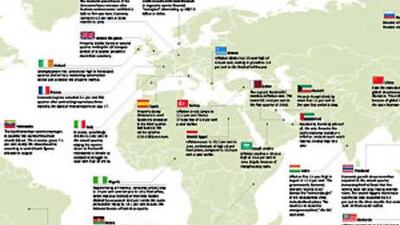It came from the deserts of Nevada and the shiny suburbs built on Florida's steamy swamp lands. Moving across heartland America with the speed of a California forest fire, the subprime superbug quickly spread to Wall Street by the end of 2006, infecting investment banks and wiping out more than US$500 billion (Dh1.8 trillion) of losses and write offs around the globe in 18 months of carnage. By now, you could hear the wheezing and coughing in lower Manhattan after the collapse of Bear Stearns in March. A flurry of redundancy slips followed, but they could so easily have been sick notes. With the summer heat descending on New York, up to 77,000 jobs in the financial sector evaporated as a new strain of the subprime superbug seeped through the veins of Wall Street.
The credit crunch had first appeared in the autumn of 2007, a by-product of the mortgage crisis that had seen a wave of repossessions in the US housing market from Denver to Detroit. Now it was leaving a trail of red ink through the books of some of America's major blue-chip finance houses, mortgage lenders and banks such as Merrill Lynch, Freddie Mac, Fannie Mae and Citigroup. Travelling across the Atlantic, the credit crunch storm rattled the British banking system and threatened to blow away Northern Rock, forcing Gordon Brown's Labour government to intervene with a £27 billion (Dh186.3bn) injection of taxpayer's money in early February. As the credit squeeze tightened, new mortgage approvals dried up in June and July, popping a 10-year property bubble. House prices crumbled in the UK, while Britain's biggest building company, Taylor Wimpey, reported a £1.54bn pretax loss for the first six months of the year on Aug 27.
"[Britain's economic circumstances] are arguably the worst they've been in 60 years," Alistair Darling, the UK chancellor of the exchequer, said three days later. "We've got our work cut out. I think it's going to be more profound and long-lasting than people thought." A similar story had started to unfold in the Euro zone. Business and consumer confidence plummeted in Germany and France, while Spain's property sector went from boom to bust in August after an unprecedented 11-year building frenzy.
"The Euro zone economic situation has deteriorated markedly,'' Carsten Brzeski, an economist at ING Group in Brussels, said on Aug 29. To make matters worse, a deadly cocktail of surging oil and food prices had unleashed inflation, the scourge of the 1970s. More than three decades later, it was wreaking havoc again by stunting growth in Europe, the Gulf and Asia. The cost of raw materials soared while the dollar dipped against the euro and yen before recovering in August. On the financial markets, stampeding bulls had been replaced by lumbering bears as investors buckled up for a white-knuckle rollercoaster ride.
"We still see no clear trigger for a sustained recovery," Gerhard Schwarz, the head of global equity strategy at UniCredit in Munich, said on Aug 29, citing the credit crisis, inflation pressures and downwards revisions of corporate earnings estimates. In Asia, fallout from the global slowdown fuelled record-breaking inflation in India, threatened to derail China's fast-track growth and stalled Japan's economy. After being consigned to the pages of history, the shadow of stagflation reappeared on the Tokyo horizon as large as the city's cult creation Godzilla. In an effort to revive the second-largest economy in the world, the former prime minister Yasuo Fukuda, who stepped down last week, announced a ¥11.7 trillion (Dh600bn) stimulus package on Aug 29.
"These measures will push up gross domestic product only by about 0.2 per cent and that isn't much for the economy in a recession," Takehiro Sato, the chief Japan economist at Morgan Stanley, said after Mr Fukuda's blueprint was revealed. Talk of recession also echoed around the banqueting halls when the world's central bankers and leading economists gathered at Jackson Hole in the Wyoming wilderness at the end of August to discuss and dissect the ailing global economy. "We shouldn't delude ourselves into thinking we are going to build a panic-proof system," Alan Blinder, the former US Federal Reserve vice chairman, said after the summit failed to come up with a prescription for recovery. "But there are choices between less and more panics, more virulent ones, less virulent ones, and that is the way we want to push the system."
Inoculating the system sounds easy but finding an antidote might be more difficult in the dark months ahead. with agencies business@thenational.ae

How the subprime superbug spread across the globe
It came from the deserts of Nevada and the shiny suburbs built on Florida's steamy swamp lands.
Most popular today
